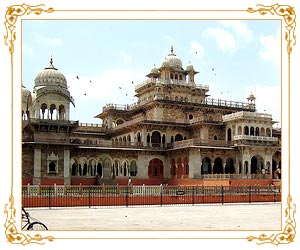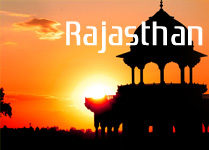 This museum is supposed to be
the oldest museum of the state. Colonel Sir Swinton Jacob designed it in
1876 to greet King Edward VII as Prince of Wales on his visit to India.
It was opened to public ten years later. Positioned amidst the gardens
of Ram Niwas Bagh in Jaipur, this museum has an assortment of rare
articles on its display including textiles, carpets, paintings, metal
and wood crafts, pottery, arms and weapons, flora and fauna of the
state, toys, dolls and even an Egyptian mummy that belongs to the
Ptolemaic Epoch. It is also known for housing the famous carpet, which
portrays the scene of a Persian garden carpet with running water streams
that was bought at a dear price from Shah Abbas of Persia, by Mirza Raja
Jai Singh I. It also puts on show the miniature paintings of a number of
sub-schools of Rajasthan.
This museum is supposed to be
the oldest museum of the state. Colonel Sir Swinton Jacob designed it in
1876 to greet King Edward VII as Prince of Wales on his visit to India.
It was opened to public ten years later. Positioned amidst the gardens
of Ram Niwas Bagh in Jaipur, this museum has an assortment of rare
articles on its display including textiles, carpets, paintings, metal
and wood crafts, pottery, arms and weapons, flora and fauna of the
state, toys, dolls and even an Egyptian mummy that belongs to the
Ptolemaic Epoch. It is also known for housing the famous carpet, which
portrays the scene of a Persian garden carpet with running water streams
that was bought at a dear price from Shah Abbas of Persia, by Mirza Raja
Jai Singh I. It also puts on show the miniature paintings of a number of
sub-schools of Rajasthan.The galleries on the ground floor of the museum have been completely remodeled and restructured since 1959 in an attempt to depict the uniqueness of the dresses and jewellery of all the classes and tribes of Rajasthani people including the privileged class that mainly consists of Rajputs and the merchant class. It includes the lifestyle of the tribals such as Meenas, Bhopas, Bhils, Gadoliya Lohars and many more. One gallery has also been committed to the henna body art of Rajasthan, popularly called as 'Mehndi Mandana', which makes an exhibition of the typical Rajasthani motifs and designs that are so well recognized as ethnic all over the world. Puppets and Phad paintings (the painted scrolls depicting the life of Pabuji Rathore, who was a great folk-hero from Marwar) occupies yet another gallery of the museum. The highlights of the museum, however, are displayed in its central gallery, which is completely devoted to the Rajasthani music and dance forms.















